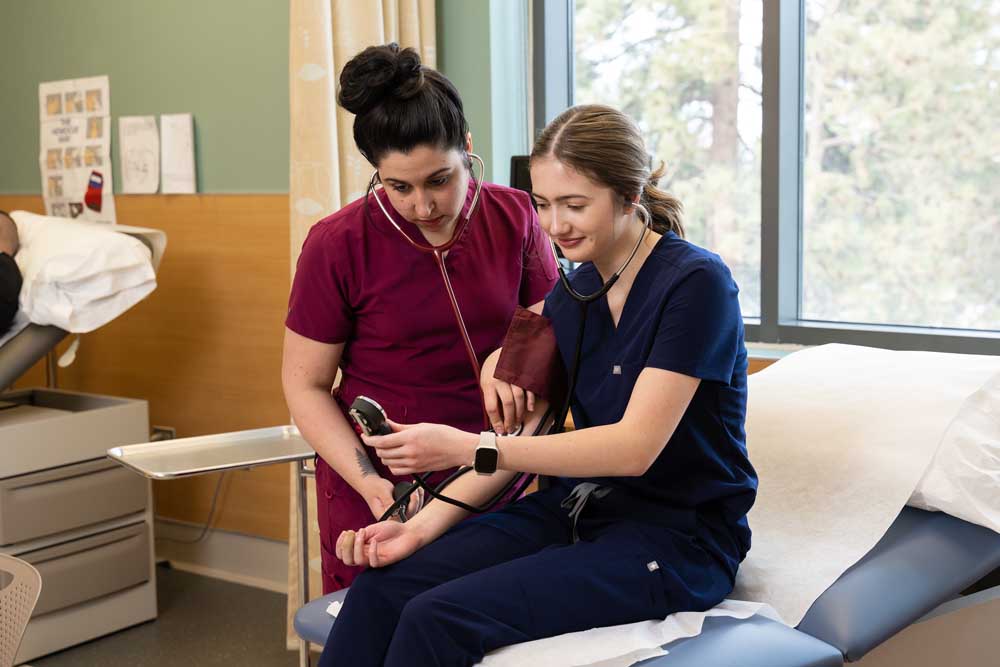Sponsored Content
Local health care students find ideal careers close to home
Published 12:00 am Sunday, October 1, 2023

- The health care sector will soon comprise 45% of the economy’s job gains
When Christina Grijalva describes possible career tracks to students in her Health Information Management classes at Central Oregon Community College (COCC), the program director often refers to her own resume as proof of what’s possible. She has experience as a clinic coordinator for a cardiology practice, an information analyst for Deschutes County, and a compliance specialist for a health solutions organization — and that’s just a sampling of where the training can take graduates.
“We have an expansive set of professions in our field,” explained Grijalva, herself a completer of the COCC program, who adds that billing, coding and insurance are all part of the industry’s spectrum.
Taught fully online, the training at COCC accommodates busy schedules but also provides office hours and time for personal attention. The one-year certificate includes coursework in medical terminology, anatomy and data systems, while the two-year degree — designed to yield a coding-focused certification after one year for quicker employability — adds in management and leadership, communications and computer technology. Both paths connect to a workforce brimming with opportunity and well-paid positions — the annual average wage for a medical records specialist, for instance, is $51,090, according to the U.S. Bureau of Labor Statistics.
“Every health care program we currently offer has jobs available right now,” said Julie Downing, COCC instructional dean. “There is a huge demand for medical assistants, nursing assistants, nurses, dental assistants, pharmacy technicians and veterinary technicians in Central Oregon.”
Every health care program we currently offer has jobs available right now,” said Julie Downing, COCC instructional dean.
That need extends well beyond the region, too. Projections from the U.S. Bureau of Labor Statistics estimate that the health care and social assistance sector will not only expand more than any other category in the coming decade, but will comprise some 45% of the economy’s job gains. It’s a healthy time to be in the health care world.
While some of COCC’s training is online, most is in person. On a recent day at the Bend campus, students head for lectures and labs in the Health Careers Center, a modern, three-level facility with specialty learning environments, including a fully functioning dental clinic and a simulated hospital wing. Program-specific scrubs — such as royal blue for Nursing, purple and black for Medical Assistant and gray for Dental Assisting — are like team colors for career ambitions.
It’s a busy building, home to the Nursing program, which includes a Certified Nursing Assistant program, and four other disciplines: Dental Assisting, Massage Therapy, Medical Assistant and Pharmacy Technician, the latter with training now redesigned and attainable in just two terms. Another fast career track: An 11-week Phlebotomy class that leads to the in-demand field of drawing blood, prepping students for work in settings like laboratories and blood donor centers.
Some health care programs, such as the college’s Veterinary Technician discipline — based in Redmond — are arranged as cohorts, where students start together and conduct their studies full time over a set period. Other options allow for a part-time focus. A brand-new Public Health certificate, for instance, which instructs students on how to help others navigate the health care system, doesn’t require a nonstop commitment. Across all departments, the college emphasizes hands-on training and immersive skill-building, including a simulated ambulance for EMS students and workplace practicums for a range of studies. Graduates soon step into key workplace roles.
“My instructors ensured I had the skills and knowledge to succeed in the field and provide high-quality care to my patients,” said Lucy Lawrence, a recent Medical Assistant grad now employed with St. Charles Health System. “And it’s a great steppingstone to more advanced careers, such as nursing, physician’s assistant or physician.”
To meet the rising needs of surging health care fields, COCC is continually updating and expanding its educational catalog. The college will soon be offering a bachelor’s degree in nursing, or BSN. “The program is expected to start up in fall of 2025 and offer 10 to 20 slots per year,” shared Downing, who adds that the selective admissions process will be open to registered nurses with an Associate of Applied Science in Nursing. A BSN opens doors to higher-paying leadership and administrative roles.
Also on the horizon: The college’s Madras campus is adding a 24,000-square-foot building — with an anticipated opening of fall 2025 — that will bring complete programs in Nursing, Nursing Assistant and Medical Assistant to the area. Interested students are encouraged to begin taking prerequisite classes now to be ready for program launches.
Curious about a health care career and want to learn more? Attend a one-hour information session, in person or on Zoom, for job descriptions, entrance requirements and expected salaries. Contact Jill Ridling, health careers outreach coordinator, at healthcareers@cocc.edu or visit cocc.edu/departments/allied-health.








